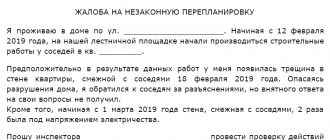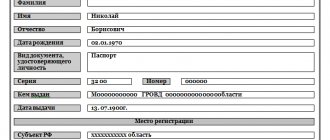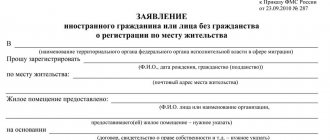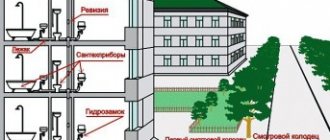The essence of the law on silence, noise and loud music
The Government of the Russian Federation has legislatively described issues regarding the time and power of noise emitted by citizens in their apartments. Every person living in an apartment building should know about the existing restrictions. Otherwise, disgruntled neighbors may resort to the police to resolve the conflict.
There is no single all-Russian act in Russian legislation. The nuances of the timing and degree (quality) of noise are determined by local authorities.
However, there are regulatory points that are the same in almost all regions of Russia:
- The average time not to disturb public peace with loud noise is between 7 a.m. and 11 p.m.
- The duration, even during the daytime, should not be more than 6 hours in a row.
- The duration of repair work carried out in residential premises (in the presence of close neighbors) is unacceptable for more than 3 months. Even taking into account non-daily noise loads.
- Weekends are meant for relaxation. You cannot listen to music loudly, including on holidays.
You can study in detail the rules of residence and maintenance of public and private premises in Law No. 25 of January 21, 2006 with current amendments of 2020 and in Appendix No. 3 of Resolution No. 64 of the Chief Sanitary and Epidemiological Doctor of June 10, 2010 (SanPiN 2.1.2.2645- 10). In addition, there is a Federal Law on sanitary and epidemiological standards for the population of Russia - Federal Decree No. 52 as amended in 2020.
The bulk of noise issues are resolved at the local level:
- periods of daytime rest;
- a time period when it is forbidden to listen to loud music and make noise;
- schedule for repair and construction work;
- clarification of terminology: peace and quiet.
Watch the video: “Until what time can you listen to loud music in an apartment building by law?”
Permissible decibels for noise in MKD
Regarding the “silence in premises” mode, Federal Decree No. 52 states that you can listen to music in an apartment at different times depending on certain noise loads:
Table 1.
| A period of time | Level in dB |
| from 7 am to 11 pm | no higher than 40 |
| from 23:00 to 7:00 | no more than 30 |
In addition, a framework has been established that is not prescribed in the law, but exists behind the scenes - quiet time - from 13:00 to 14-15:00.
Noise norm and what it can be compared with
The daytime noise level is 40 dB, night - 30 dB.
A decibel is a measure of overall loudness. There are special devices for measuring such load.
In the hotel business, devices are often used, because a high-class hotel or boarding house has clearly established standards for the level of accommodation. One of these indicators is the silence in the rooms.
What can the permissible noise level (DB) be compared to:
- a steam locomotive (train) passing nearby – 100;
- conversation in a raised voice, turning into shouting is about 60;
- a plane taking off or landing has a volume of 120;
- musical equipment with speakers and a stereo effect, i.e. the song playing in the apartment is played up to 110;
- sound of a working hair dryer – 80;
- when the hammer is turned on at full power it reaches 140;
- playing the piano no more than 95;
- The spin mode in the washing machine averages 60-70 depending on the program;
- function of draining water in the toilet cistern – 75;
- working vacuum cleaner of old models – 85.
The moral side of the noise issue
Sound pressure level in Pa and dB
Living in close proximity to strangers in general is a difficult thing, because all citizens have differences, both on the physical and mental level. The norms of each person cannot coincide with those of their neighbor, so it is very important to find that golden mean in relations with people living nearby.
Someone in the family has tiny children, elderly parents or disabled people. For these categories of people, maintaining calm and silence is the key to health. Loud music and noise are extremely annoying.
In addition, there are different psychotypes - “lark”, “night owl”. At the same time, every citizen of Russia has the right to personal life and expression of interests. But the important thing is that where the powers of one person cross the neighboring border, a conflict of interests begins. The ability to find compromises is the key to good relationships with others. Therefore, peaceful coexistence with respect and awareness that a person lives in an apartment building is the basis of a civilized society.
Federal Law on maintaining silence in an apartment building in 2020: official text
For the first time, State Duma deputies were faced with the need to adopt Federal Law 52 in 1999. The new bill has determined the time when it is forbidden to make noise in apartments. The official text was changed several times, establishing new periods of silence.
Today, the law requires residents of apartment buildings to reduce the volume level in their premises to 30 dB between 21:00 and 8:00 on weekdays. Silence on weekends and holidays should be ensured from 22.00 to 10.00. Parliamentarians made an exception for New Year's Eve, when noise is officially allowed.
Certain rules have been established for carrying out repair work. According to the law on silence, residents of apartment buildings are obliged to ensure a low level of noise, regardless of the reasons for which it is produced. Otherwise, other residents have the right to complain about violators, and they will have to pay fines for disturbing the silence.
To avoid misunderstandings with neighbors, we suggest downloading the text of the law on silence from the following link. It contains complete information in the latest version of the bill.
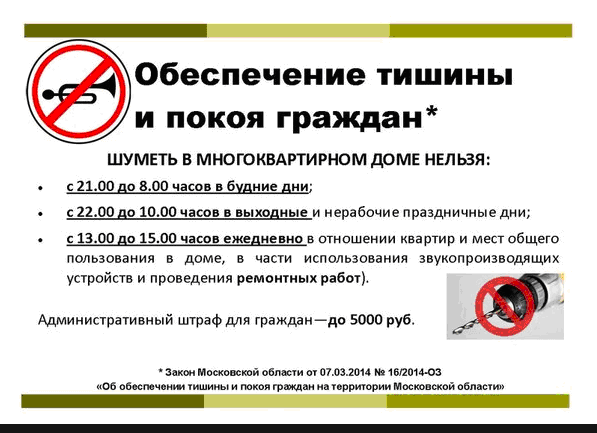
What kind of noise is considered a violation?
The law clearly defines what kind of noise is considered a violation of standards. Basically, any loud noise that disturbs your neighbors can be a cause for complaint. You can be fined in 2020 for the following actions:
- excessive speech volume, shouting;
- the use of objects that make noise (this concept includes noisy household appliances, as well as explosive substances, such as firecrackers);
- construction and finishing works;
- exceeding the volume of the TV or devices that reproduce audio sounds;
- car alarm operation;
- barking or howling of domestic animals, regarding which the owner does not take any action;
- moving furniture;
- baby crying.
You don't have to worry about loud noises if your apartment is soundproofed. In this case, neighbors are unlikely to hear what is happening in your home. In other situations, the established rules must be followed. Moreover, they operate not only inside apartments, but also on the street.
Read also: What to do if you don’t have money to pay for a loan
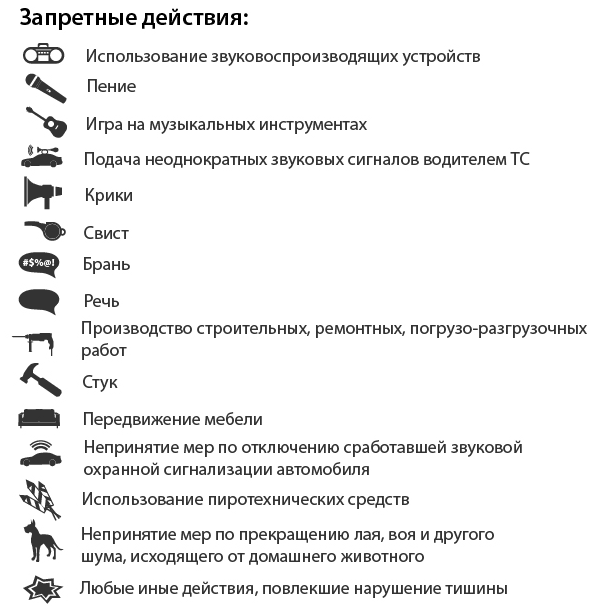
When not to make noise: norms in the regions
Although the law establishes a certain time for silence, these data in almost all regions were changed to adapt to local residents. For example, in the capital you cannot make loud noises between 23:00 and 7:00 on weekdays. In other regions there is a ban on noisy activities from 22.00 to 8.00, etc.
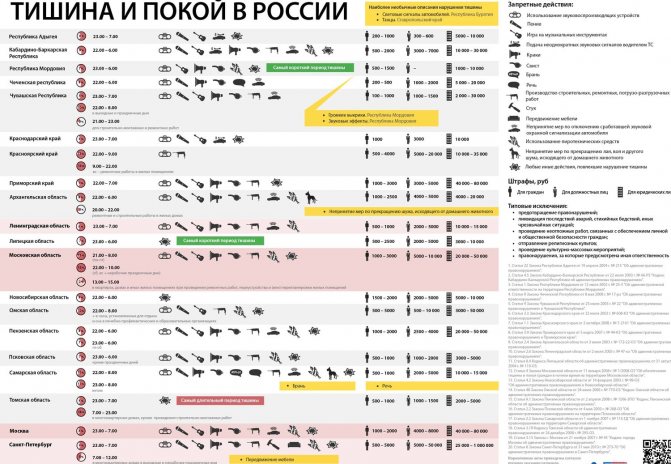
The law also provides for the so-called “quiet hour” - a period during the day when the volume level cannot be exceeded. In most regions it lasts from 13.00 to 15.00, in some - from 12.00 to 14.00. “Quiet hour” primarily protects the rights of parents, since it allows them to put the child to bed without fear that sleep will be interrupted by loud music or the sound of a hammer drill.
Moscow (MSK) and Moscow region
St. Petersburg (SPB)
Quiet on weekends and holidays
On weekends, neighbors are required to ensure low noise levels between 10 p.m. and 10 a.m. In many regions, this norm was changed and other periods were established when it is prohibited to exceed the volume. Most often, night time on weekends and holidays begins after 23.00 and lasts until 10.00 or 11.00.
Repair work cannot be carried out unless it concerns the safety of residents. True, in some regions they made concessions and allowed construction work to be carried out on days when a day off was declared a working day.
How long can you listen to loud music and make noise?
Listening to loud music, as well as making other sounds, is allowed by law at strictly fixed times. Russian regional authorities are authorized to establish a period of silence independently, without resorting to federal regulations. For example, in Moscow there is law No. 42 of July 12, 2002.
The table below contains information to familiarize yourself with noise and loud music in different areas of the country:
Table 2.
| Subject | Time period allowed for noise extraction |
| Moscow city | from 08 to 21:00 |
| Moscow region | from 08 to 21:00 |
| Novosibirsk city | from 08 am to 20 o'clock |
| Yekaterinburg city | from 08:00 to 22:00 |
| Chelyabinsk | from 06:00 to 22:00 |
| Tatarstan | from 06 to 23:00 |
| Nizhny Novgorod | from 8 am to 22:00 |
| Kemerovo | from 08:00 to 20:00 |
| Saratov | from 09:00 to 21:00 |
| Volgograd | from 07:00 to 22:00 |
| Arkhangelsk | from 07:00 to 22:00 |
| Kirov | from 8 am to 21:00 |
| Tver | from 07:00 to 23:00 |
| Omsk | from 08:00 to 22:00 |
| Perm | from 07:00 to 10 pm |
| Bashkiria | from 07 to 23:00 |
Noise day and night
Daytime hours are the time when you can allow yourself and your neighbors to listen to music loudly during the day, as well as do repair work and vigorously sort things out.
But this period can begin depending on the place of residence - at six or eight o’clock in the morning. In the evening, the noisy bacchanalia will have to end at approximately 22:00, and in some regions of Russia even earlier.
It is legally established that on weekends and officially celebrated holidays it is unacceptable to make excessive noise at any time.
Noise on weekdays
On normal working days, listening to loud music at full volume, and doing repairs is quite acceptable during the daytime. The only thing, of course, is to check with people living in the neighborhood whether there are nursing women, mothers with babies or pensioners.
Such citizens have a schedule that includes nap time. In order to maintain good relations with your neighbors, you should listen to their requests and slightly reduce the pace of repairs, listening to music and other noise in the afternoon.
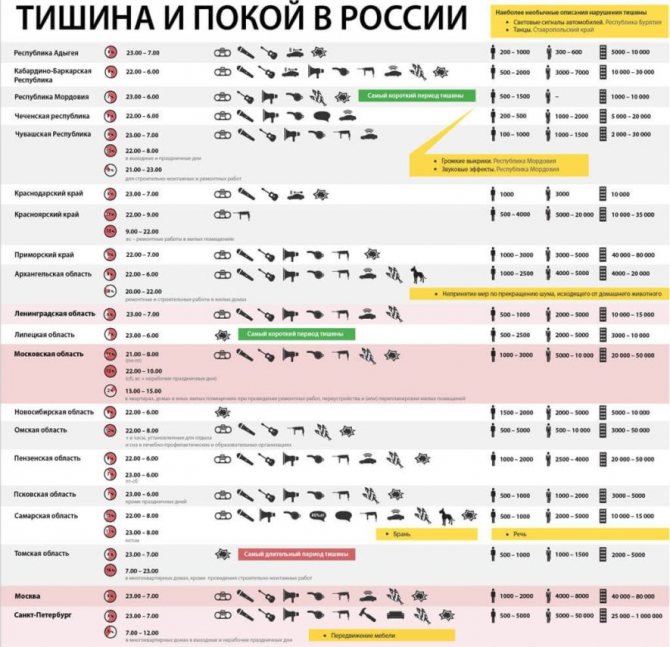
Legislative regulation of peace and quiet in the regions of the Russian Federation
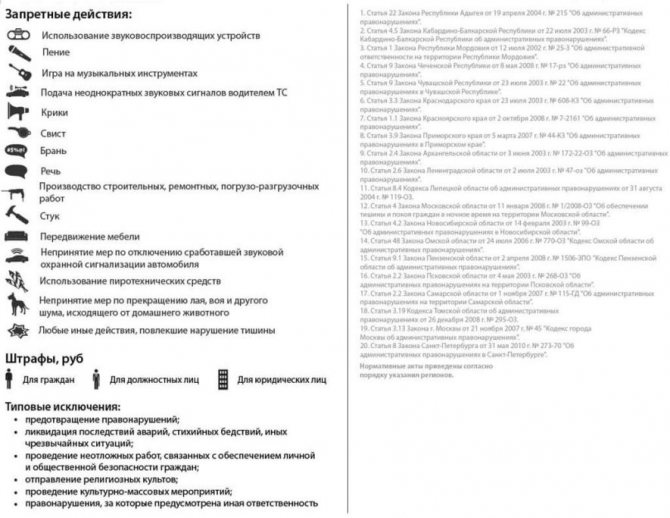
Decoding prohibited actions, fines, regional laws
Noise on weekends and holidays
Holidays and weekends officially recognized by the Russian government are a time for people to relax from everyday work. According to the law, it is forbidden to make excessive noise at such a time.
The average volume level should start a little later than on weekdays and end earlier. In other words, plus or minus 2 hours to the time allowed for daytime “noise”. For example, morning is 10:00 and evening is 20:00.
Official weekends in Russia are Sunday and Saturday.
Noise during renovation
Repair work of any complexity must be carried out during the day, in accordance with the noise schedule. Each region regulates these indicators in its own way. But there is a general requirement for the entire country - repair work should not be carried out at night, on weekends and on holidays.
Moreover, the total period of activities is no more than 90 days. contract. It is not taken into account - the noise occurred daily or every other day. The completion time for repair and construction work is 19:00 pm. This is the period when people return home and need rest.
Removal and disposal of garbage remaining after major repairs is allowed between 8 a.m. and 10 p.m. It should be taken into account whether additional noise occurs during such events.
What the law says
The main law limiting the time during which noise can be made is considered to be Federal Law 54 “On Silence”. The law was first passed in 1999. In 2019 and 2020, the latest amendments were made regarding the time when noise can be made and the permissible sound level. The definition of noise, in accordance with the adopted legal act, includes the following:
- screaming, loud talking, crying;
- loud music;
- dog barking, meowing and other noises made by animals;
- sounds produced by household appliances;
- sounds produced by construction equipment and tools.
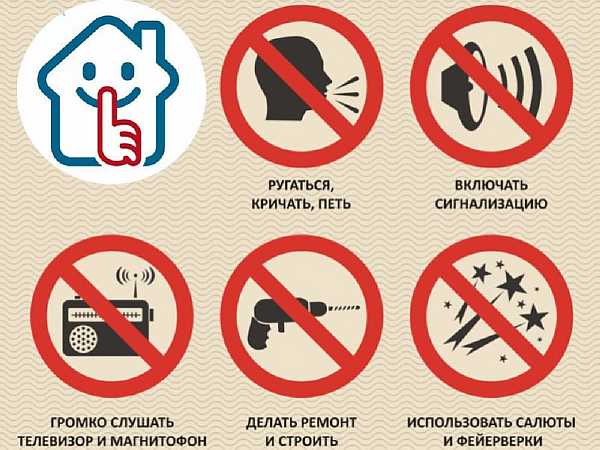
You can't make noise at night
The law specifies how long it is permissible to listen to loud music. In the regions it is from 7:00 to 21:00.
However, in many of them the time is from 8:00 to 21:00 on weekdays and from 10:00 to 22:00 on weekends. As, for example, in Moscow and the Moscow region.
In Yekaterinburg, Nizhny Novgorod and Tyumen, you can listen to music from 8:00 to 22:00 on weekdays and weekends. In Novosibirsk, the law sets this time from 8:00 to 22:00 on weekdays and from 9:00 to 20:00 on weekends.
What measures can be taken against violators of the silence law?
Naturally, the first step in a situation where your neighbors are listening to loud music at night is to go and talk to them. However, there are cases when such people cannot be reached, both literally and figuratively.
Police officers come to help resolve such situations. A call to the local police station and a police officer may solve the problem. Having arrived at the address, a representative of the Ministry of Internal Affairs draws up a special incident report. Records witness statements as necessary.
Sample protocol on administrative violations.
The presence of such documents is mandatory, because without it the court will not make a decision on punishment for the violator of public order.
The decision to impose an administrative fine is made by the judge.
In practice, the average amount of sanctions is:
- For a primary complaint about noise – no more than 1000 rubles.
- If the situation was not resolved the first time and the claim was sent again, then the amount will be increased six times and will be about 6,000 rubles.
- Being a “malicious repeat offender” for creating noise for others can receive an administrative penalty of 15 days in prison.
If your neighbors listen to music loudly, you can complain to RosPotrebNadzor, in addition to the police. Department employees come to the site and take measurements with a special device. After this, a report is drawn up indicating the address, name of the applicant and the level of audible noise in the apartment. Further, you can apply this document to the prosecutor’s office or judicial authorities.
Types of penalties for noise
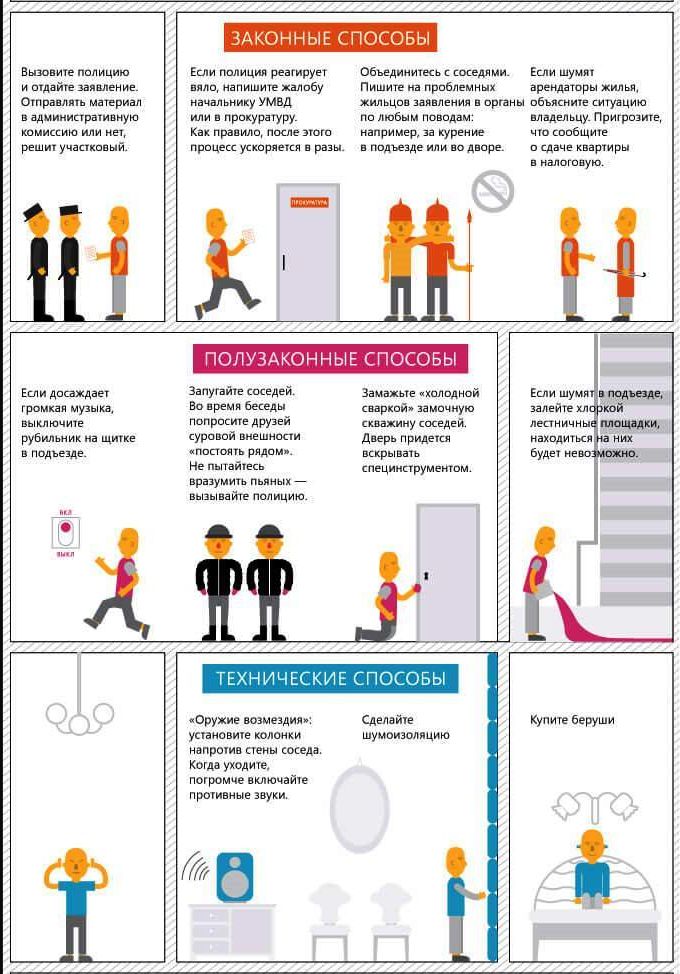
Ways to deal with rowdies
After receiving two complaints, the judge imposes a fine on the culprit in the amount of 500 to 6,000 rubles. If the claims against the citizen are permanent, then the supreme authorities have the right to order arrest for 15 days.
A legal entity will be subject to a 90-day suspension of activities for noise. In addition, you can receive a fine of 10 to 300 thousand rubles.
Complaint to the local police officer about noisy neighbors
When contacting your local police officer, you must fill out an application in two copies. Register the paper at the police station. On one document the date of circulation and the serial number of the journal entry are established.
A response to a noise complaint must be made within 10 working days. During this time, the district police officer is obliged to communicate with people who have disturbed the peace of fellow citizens and write a report on the fact of the work carried out.
Sample complaint to the district commissioner about noisy neighbors.



